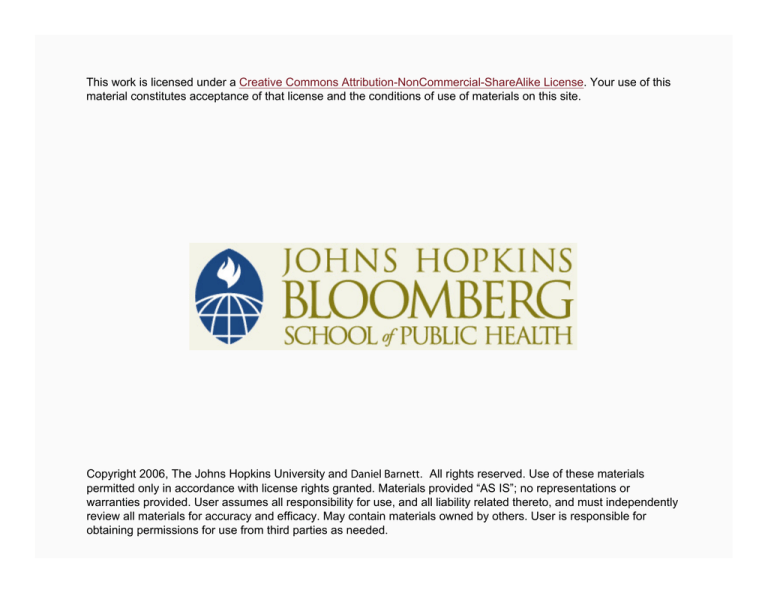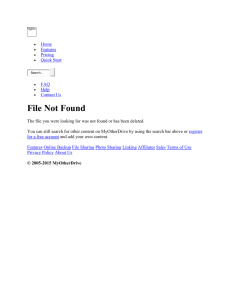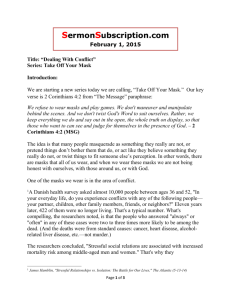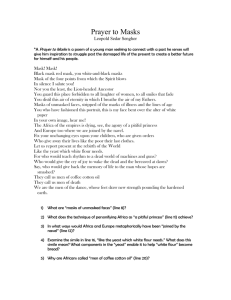
This work is licensed under a Creative Commons Attribution-NonCommercial-ShareAlike License. Your use of this
material constitutes acceptance of that license and the conditions of use of materials on this site.
Copyright 2006, The Johns Hopkins University and Daniel Barnett. All rights reserved. Use of these materials
permitted only in accordance with license rights granted. Materials provided “AS IS”; no representations or
warranties provided. User assumes all responsibility for use, and all liability related thereto, and must independently
review all materials for accuracy and efficacy. May contain materials owned by others. User is responsible for
obtaining permissions for use from third parties as needed.
Personal Preparedness Planning For Public Health
Workers
Daniel Barnett, MD, MPH
Johns Hopkins Center for Public Health Preparedness
Learning More About Readiness
Part 3 of 3
Essential Planning Elements
Know where to turn for information in a crisis
Understand key health care issues following mass casualty
incidents and how you can prepare yourself and your family
for these issues
Consider individuals with special needs
Understand answers to FAQs
Information Sources in a Crisis
Tune to local AM radio for alerts and periodic updates
Tune to local television news channels
Healthcare Provider Considerations
Healthcare delivery systems will quickly reach maximum
capacity
Medical advice/physical examinations may be limited
Elective or postponable surgeries will be cancelled
Existing health conditions may be complicated during
stressful situations
Advance Planning
Things you should do:
− Have all prescriptions
− Keep 3 days of prescriptions on hand at all times
− Have your insurance information available
− Have immunization record handy
− Know style and serial number of medical devices (e.g.,
pacemakers)
− List known food and drug allergies
− Write down the health conditions of your immediate
family
Advance Planning
Attend a first aid/CPR class
Memorize two routes to the office of your health care
provider
Hospital visits should be reserved for known exposures,
trauma, and other critical health events
Donate blood to save lives; it will be critically needed
Special Needs Considerations
Children
Elderly
Disabled
Pets
FAQ #1: Should I Purchase a Gas Mask?
NO!
A gas mask will only protect you if you are wearing it during
an attack
− It is highly unlikely that you will know when an attack is
coming
The mask must be of the right type, must fit properly, and
requires training to be used effectively
FAQ #2: What About Disposable Masks?
Disposable, paper masks (e.g., N95 masks) suffer from the
same inadequacies as gas masks in a biological weapons
attack situation—when to wear the mask, proper fit, etc.—
and would likely offer little protection, if any, from a BW
attack
In addition they provide no protection against chemical
attacks
FAQ #2: What About Disposable Masks?
Nevertheless—they may help
prevent exposure to potentially
dangerous substances aerosolized
after an explosion
Any dense-weave cotton material
that snugly covers your nose and mouth
can help filter contaminants in an emergency
More info at http://www.ready.gov/clean_air.html
FAQ #3: What Is “Shelter-in-Place”?
Shelter-in-place means:
− Selecting a small, interior room—with no or few windows
− Sealing the room off to limit airflow (e.g., duct tape/plastic)
into the room
− Taking temporary cover there to reduce exposure to
potentially dangerous substances in the air
It does not mean sealing off your entire home or office building
Additional resources:
−
www.redcross.org/services/disaster/beprepared/shelterinplace.pdf
−
www.ready.gov/stay_or_go.html
FAQ # 4: Should I Shelter-in-Place?
Whether to shelter-in-place depends on the particular
circumstances of the attack
In a covert biological attack, you will not know when to seal
off a room and stay in there
Nevertheless, it is possible that circumstances could require
sheltering-in-place
− Listen to health authorities
More info at http://www.ready.gov/stay_or_go.html
FAQ #5: Should I Stockpile My Own Antibiotics?
NO!
Why not?
− No single antibiotic protects against all potential bioweapons agents
− Ineffective against viruses
− Limited shelf life
− Can have serious side effects
− Should only be taken with medical guidance
FAQ #6: So What Can I Do?
The most important things to do following a mass
incident are:
− Remain calm
− Be patient
− Listen carefully to information from and follow the advice
of medical and public health authorities
− Implement personal/family preparedness
communications plan
− Be accessible and ready to serve in your public health
response roles per your health department’s guidance
Where to Get More Information
By U.S. mail/phone
− U.S. Department of Homeland Security
Washington, D.C. 20528
1-800-BE-READY
Red Cross USA
− Visit http://www.redcross.org/ to find your local chapter’s
contact information
Where to Get More Information
http://www.bt.cdc.gov/Agent/agentlist.asp
http://www.redcross.org/services/disaster/beprepared/hsas.h
tml
http://www.ready.gov/
http://www.fema.gov/areyouready/
http://www.dhs.gov/dhspublic/theme_home2.jsp





